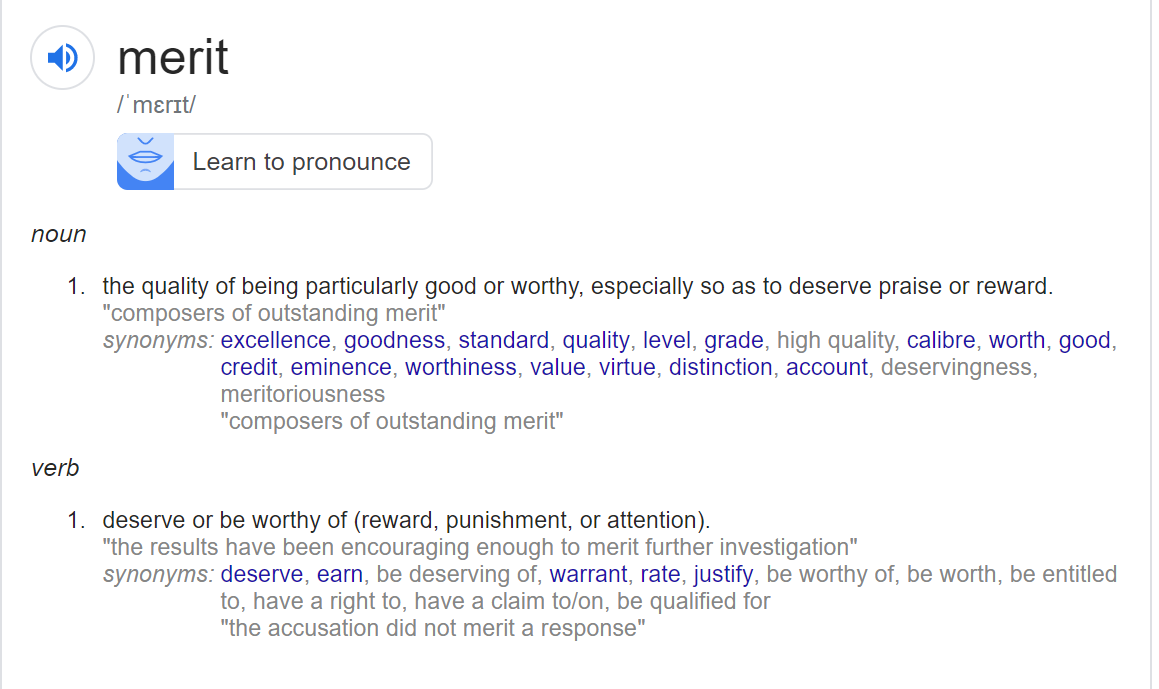A short soliloquy on merit
Soliloquy is a dramatic device used when a character speaks to herself, “relating thoughts and feelings, thereby also sharing them with the audience, giving off the illusion of being a series of unspoken reflections” (Wikipedia).
The following is a short soliloquy inspired by Google’s definition of merit and the question of “what = merit”. I wrote it in light of a crisis and awareness of racism in the Communication discipline and the ways that diversity and merit have been framed as antithetical.
The italicized words in the soliloquy come straight from the Google definition. In the soliloquy I am both speaker and listener. Interrogator and discipliner. Betwixt and between. Liminal.

* * * * *
Are you meritorious? Are you excellent? Are you good?
To be meritorious is to be standard. Are you standard? Do you avoid drawing outside the lines?
To be meritorious is to be level. Are you level? For goodness sake, be level-headed, polite, and civil.
If you are not standard and you are not level, you will certainly not make the grade. Better do some extra credit if you ever hope to be worthy.
And take time to account for your virtue. You do want to be virtuous, yes? And praised?
Learn the right forms of virtue and you too may someday be deserving of distinction, worthy of credit, and entitled to eminence.
Just make sure to account for it in standard ways that show your quality. You need to clearly show your caliber in order to receive the right kind of attention.
What? You say you have different values and virtue from the level standard? Quality for you looks different? Your attention seeks non-standard reward?
Hush my darling.
Shhhh… Best keep that to yourself. Or better yet, morph. Simply change thyself.
If not, you may attract the wrong attention, worthy of punishment.

Do you know the people who are arbiters of merit? They get to say whether you are entitled to distinction. Only they have a right to praise you as qualified.
Do you want to earn their approval? Keep leveling. Keep standardizing. Keep accounting.
Someday, maybe, your efforts will warrant deservingness. Someday, maybe, they will achieve the mantel of quality.
Keep striving. Try just a wee bit harder. Because the criteria for excellence, distinction and praise are neutral––based purely on merit.
The communication discipline is bleeding
NOTE: If you want more on the ongoing conversation that my comments are situated within, please explore our colleagues’ commentary on Twitter with hashtag #CommunicationSoWhite, read the backstory of these issues via Mohan Dutta’s astute commentary: https://culture-centered.blogspot.com/2019/06/in-post-made-in-response-to-changes-to.html and examine NCA’s record of documents about the distinguished scholar nomination processes and (lack of systematic) changes https://www.natcom.org/distinguished-scholars?fbclid=IwAR3pvlh-Wf78cbzcesDFSlI2rVi-yKopYlRdtAcMoYzpRK9X1GSUWMb9u0I
The communication discipline is bleeding. Pus oozing. Vomit erupting.
We are suffering.
Most humans turn away from suffering. We build walls on our freeways so we don’t see poverty on our daily commute. We build gates around our communities. We don’t look homeless people in the eye. We conveniently delete, scroll through, or click “sad” or “angry” emojis before quickly moving on.
And, right now, it would be easy, especially for the privileged among us, to turn away from the suffering of our discipline. It’s summer after all. Email auto-replies prove that we are “out of the office”. This is time for family, vacation, and writing!
But this suffering is not suddenly new. It’s been at a slow simmer. Will we ignore this boiling flashpoint?
Of course, only some of us, the privileged among us, have the luxury of ignoring. Or maybe we don’t ignore, but instead treat the situation as perfect summer entertainment. Heck, let’s just get out the popcorn and watch it all go down. Who will be the heroes? Who will be the villains? When will the usual players make their appearance? CRTNET hasn’t been this entertaining for years!
When suffering becomes a drama to be watched from the sidelines, the more vitriol, violence, conflict, and casualties the better. But our colleagues' suffering should not be entertainment.
What if, instead of ignoring or watching as spectacle, we chose to be courageous? What if I chose to be courageous? My coauthors’ and my very own research tells me that the courageous thing to do in the face of suffering is to show compassion.
Compassion comes in the form of recognizing and acknowledging suffering—deeply listening, hearing, and accepting the reality of truths and experiences of those who are suffering. It also means relating vulnerably, which requires us to be open to our own faults and uncertainties—admitting where we have been part of the problem, and choosing to engage in the conversation even if, by doing so, we might engage poorly and sometimes put our foot in our mouth. It means being o.k. when people point out that we did not say things quite right or that our well-intentioned compassion does not result in consequences that actually alleviate suffering. It means being o.k. with hearing that we may have actually made the suffering worse.
Indeed, relating vulnerably takes practice. And anything worth doing well is worth doing badly in the beginning. And after doing it badly, being compassionate (to ourselves and others) means caring less about “looking good” and caring more about (re)listening and courageously trying again.
Finally, and most importantly (and what differentiates compassion from empathy), compassion means acting or reacting in a way so as to materially relieve suffering. Certainly, this may be at the individual level (e.g., sending a supportive note). However, this also comes in the form of transforming structures that result in oppression.
As I have read the recent words from my colleagues of color—among others, Bernadette Calafell, Karma Chávez, Devika Chawla, Amira De La Garza, Mohan Dutta—I am again struck by the immense emotional labor and resilience required to shoulder, resist, and deal with ongoing and ever-present disciplinary structures that say, “You don’t belong here. Get out.” The people in power say, “but we have changed the rules of the game, you can now enter.” And then the powerful seem mystified saying, “Well, we changed the rules so you could enter, and unfortunately not enough people came.” Dragging oneself to the door, to just see it be shut (again), is more than exclusion. It’s trickery. Chicanery.
It’s one thing to be isolated, another thing to be tricked. The first is mean. The second is evil.
People are suffering because the structures of the communication discipline have resulted in evil consequences.
When doors are closed day after day and year after year, it’s not just suffering, but exhaustion and justified outrage. As such, it’s not enough to tweak the rules to the game. It may not even be enough to completely change the rules of the game (which it seems some folks are willing to do). Over time, we need to question the game itself.
Among other questions, we should be asking is this: “What does the institution of distinguished scholars produce at the structural level for the communication discipline?” When I use the word produce, I mean it in the way that Foucault talks about power “producing.” So, I am asking us to consider both intended and unintended consequences.
And, if we cannot come up with good answers, perhaps now is a moment in the discipline when we rise up and say, “new game.”





